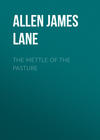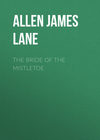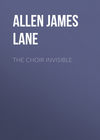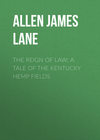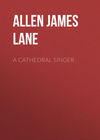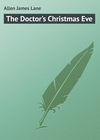Kitabı oku: «The Mettle of the Pasture», sayfa 11
II
It was the second morning after Marguerite's ball.
Marguerite, to herself a girl no longer, lay in the middle of a great, fragrant, drowsy bed of carved walnut, once her grandmother's. She had been dreaming; she had just awakened. The sun, long since risen above the trees of the yard, was slanting through the leaves and roses that formed an outside lattice to her window-blinds.
These blinds were very old. They had been her grandmother's when she was Marguerite's age; and one day, not long before this, Marguerite, pillaging the attic, had found them and brought them down, with adoring eyes, and put them up before her own windows. They were of thin muslin, and on them were painted scenes representing the River of Life, with hills and castles, valleys and streams, in a long series; at the end there was a faint vision of a crystal dome in the air—the Celestial City—nearly washed away. You looked at these scenes through the arches of a ruined castle. A young man (on one blind) has just said farewell to his parents on the steps of the castle and is rowing away down the River of Life. At the prow of his boat is the figurehead of a winged woman holding an hour-glass.
Marguerite lay on her side, sleepily contemplating the whole scene between her thick, bosky lashes. She liked everything but the winged woman holding the hour-glass. Had she been that woman, she would have dropped the hour-glass into the blue, burying water, and have reached up her hand for the young man to draw her into the boat with him. And she would have taken off her wings and cast them away upon the hurrying river. To have been alone with him, no hour-glass, no wings, rowing away on Life's long voyage, past castles and valleys, and never ending woods and streams! As to the Celestial City, she would have liked her blinds better if the rains of her grandmother's youth had washed it away altogether. It was not the desirable end of such a journey: she did not care to land there.
Marguerite slipped drowsily over to the edge of the bed in order to be nearer the blinds; and she began to study what was left of the face of the young man just starting on his adventures from the house of his fathers. Who was he? Of whom did he cause her to think? She sat up in bed and propped her face in the palms of her hands—the April face with its October eyes—and lapsed into what had been her dreams of the night. The laces of her nightgown dropped from her wrists to her elbows; the masses of her hair, like sunlit autumn maize, fell down over her neck and shoulders into the purity of the bed.
Until the evening of her party the world had been to Marguerite something that arranged all her happiness and never interfered with it. Only soundness and loveliness of nature, inborn, undestroyable, could have withstood such luxury, indulgence, surfeit as she had always known.
On that night which was designed to end for her the life of childhood, she had, for the first time, beheld the symbol of the world's diviner beauty—a cross. All her guests had individually greeted her as though each were happier in her happiness. Except one—he did not care. He had spoken to her upon entering with the manner of one who wished himself elsewhere, he alone brought no tribute to her of any kind, in his eyes, by his smile, through the pressure of his hand.
The slight wounded her at the moment; she had not expected to have a guest to whom she would be nothing and to whom it would seem no unkindness to let her know this. The slight left its trail of pain as the evening wore on and he did not come near her. Several times, while standing close to him, she had looked her surprise, had shadowed her face with coldness for him to see. For the first time in her life she felt herself rejected, suffered the fascination of that pain. Afterward she had intentionally pressed so close to him in the throng of her guests that her arm brushed his sleeve. At last she had disengaged herself from all others and had even gone to him with the inquiries of a hostess; and he had forced himself to smile at her and had forgotten her while he spoke to her—as though she were a child. All her nature was exquisitely loosened that night, and quivering; it was not a time to be so wounded and to forget.
She did not forget as she sat in her room after all had gone. She took the kindnesses and caresses, the congratulations and triumphs, of those full-fruited hours, pressed them together and derived merely one clear drop of bitterness—the languorous poison of one haunting desire. It followed her into her sleep and through the next day; and not until night came again and she had passed through the gateway of dreams was she happy: for in those dreams it was he who was setting out from the house of his fathers on a voyage down the River of Life; and he had paused and turned and called her to come to him and be with him always.
Marguerite lifted her face from her palms, as she finished her revery. She slipped to the floor out of the big walnut bed, and crossing to the blinds laid her fingers on the young man's shoulder. It was the movement with which one says: "I have come."
With a sigh she drew one of the blinds aside and looked out upon the leaves and roses of her yard and at the dazzling sunlight. Within a few feet of her a bird was singing. "How can you?" she said. "If you loved, you would be silent. Your wings would droop. You could neither sing nor fly." She turned dreamily back into her room and wandered over to a little table on which her violin lay in its box. She lifted the top and thrummed the strings. "How could I ever have loved you?"
She dressed absent-mindedly. How should she spend the forenoon? Some of her friends would be coming to talk over the party; there would be callers; there was the summer-house, her hammock, her phaeton; there were nooks and seats, cool, fragrant; there were her mother and grandmother to prattle to and caress. "No," she said, "not any of them. One person only. I must see him."
She thought of the places where she could probably see him if he should be in town that day. There was only one—the library. Often, when there, she had seen him pass in and out. He had no need to come for books or periodicals, all these he could have at home; but she had heard the librarian and him at work; over the files of old papers containing accounts of early agricultural affairs and the first cattle-shows of the state. She resolved to go to the library: what desire had she ever known that she had not gratified?
When Marguerite, about eleven o'clock, approached the library a little fearfully, she saw Barbee pacing to and fro on the sidewalk before the steps. She felt inclined to turn back; he was the last person she cared to meet this morning. Play with him had suddenly ended as a picnic in a spring grove is interrupted by a tempest.
"I ought to tell him at once," she said; and she went forward.
He came to meet her—with a countenance dissatisfied and reproachful. It struck her that his thin large ears looked yellowish instead of red and that his freckles had apparently spread and thickened. She asked herself why she had never before realized how boyish he was.
"Marguerite," he said at once, as though the matter were to be taken firmly in hand, "you treated me shabbily the night of your party. It was unworthy of you. And I will not stand it. You ought not be such a child!"
Her breath was taken away. She blanched and her eyes dilated as she looked at him: the lash of words had never been laid on her.
"Are you calling me to account?" she asked. "Then I shall call you to an account. When you came up to speak to grandmother and to mamma and me, you spoke to us as though you were an indifferent suitor of mine—as though I were a suitor of yours. As soon as you were gone, mamma said to me: 'What have you been doing, Marguerite, that he should think you are in love with him—that he should treat us as though we all wished to catch him?'"
"That was a mistake of your mother's. But after what had passed between us—"
"No matter what had passed between us, I do not think that a man would virtually tell a girl's mother on her: a boy might."
He grew ashen; and he took his hand out of his pockets and straightened himself from his slouchy lounging posture, and stood before her, his head in the air on his long neck like a young stag affronted and enraged.
"It is true, I have sometimes been too much like a boy with you," he said. "Have you made it possible for me to be anything else?"
"Then I'll make it possible for you now: to begin, I am too old to be called to account for my actions—except by those who have the right."
"You mean, that I have no right—after what has passed—"
"Nothing has passed between us!"
"Marguerite," he said, "do you mean that you do not love me?"
"Can you not see?"
She was standing on the steps above him. The many-fluted parasol with its long silken fringes rested on one shoulder. Her face in the dazzling sunlight, under her hat, had lost its gayety. Her eyes rested upon his with perfect quietness.
"I do not believe that you yourself know whether you love me," he said, laughing pitifully. His big mouth twitched and his love had come back into his eyes quickly enough.
"Let me tell you how I know," she said, with more kindness. "If I loved you, I could not stand here and speak of it to you in this way. I could not tell you you are not a man. Everything in me would go down before you. You could do with my life what you pleased. No one in comparison with you would mean anything to me—not even mamma. As long as I was with you, I should never wish to sleep; if you were away from me, I should never wish to waken. If you were poor, if you were in trouble, you would be all the dearer to me—if you only loved me, only loved me!"
Who is it that can mark down the moment when we ceased to be children? Gazing backward in after years, we sometimes attempt dimly to fix the time. "It probably occurred on that day," we declare; "it may have taken place during that night. It coincided with that hardship, or with that mastery of life." But a child can suffer and can triumph as a man or a woman, yet remain a child. Like man and woman it can hate, envy, malign, cheat, lie, tyrannize; or bless, cheer, defend, drop its pitying tears, pour out its heroic spirit. Love alone among the passions parts the two eternities of a lifetime. The instant it is born, the child which was its parent is dead.
As Marguerite suddenly ceased speaking, frightened by the secret import of her own words, her skin, which had the satinlike fineness and sheen of white poppy leaves, became dyed from brow to breast with a surging flame of rose. She turned partly away from Barbee, and she waited for him to go.
He looked at her a moment with torment in his eyes; then, lifting his hat without a word, he turned and walked proudly down the street toward his office.
Marguerite did not send a glance after him. What can make us so cruel to those who vainly love us as our vain love of some one else? What do we care for their suffering? We see it in their faces, hear it in their speech, feel it as the tragedy of their lives. But we turn away from them unmoved and cry out at the heartlessness of those whom our own faces and words and sorrow do not touch.
She lowered her parasol, and pressing her palm against one cheek and then the other, to force back the betraying blood, hurried agitated and elated into the library. A new kind of excitement filled her: she had confessed her secret, had proved her fidelity to him she loved by turning off the playmate of childhood. Who does not know the relief of confessing to some one who does not understand?
The interior of the library was an immense rectangular room. Book shelves projected from each side toward the middle, forming alcoves. Seated in one of these alcoves, you could be seen only by persons who should chance to pass. The library was never crowded and it was nearly empty now. Marguerite lingered to speak with the librarian, meantime looking carefully around the room; and then moved on toward the shelves where she remembered having once seen a certain book of which she was now thinking. It had not interested her then; she had heard it spoken of since, but it had not interested her since. Only to-day something new within herself drew her toward it.
No one was in the alcove she entered. After a while she found her book and seated herself in a nook of the walls with her face turned in the one direction from which she could be discovered by any one passing. While she read, she wished to watch: might he not pass?
It was a very old volume, thumbed by generations of readers. Pages were gone, the halves of pages worn away or tattered. It was printed in an old style of uncertain spelling so that the period of its authorship could in this way be but doubtfully indicated. Ostensibly it came down from the ruder, plainer speech of old English times, which may have found leisure for such "A Booke of Folly."
Marguerite's eyes settled first on the complete title: "Lady Bluefields' First Principles of Courting for Ye Use of Ye Ladies; but Plainly Set Down for Ye Good of Ye Beginners."
"I am not a beginner," thought Marguerite, who had been in love three days; and she began to read:
"Now of all artes ye most ancient is ye lovely arte of courting. It is ye earliest form of ye chase. It is older than hawking or hunting ye wilde bore. It is older than ye flint age or ye stone aye, being as old as ye bones in ye man his body and in ye woman her body. It began in ye Garden of Eden and is as old as ye old devil himself."
Marguerite laughed: she thought Lady Bluefields delightful.
"Now ye only purpose in all God His world of ye arte of courting is to create love where love is not, or to make it grow where it has begun. But whether ye wish to create love or to blow ye little coal into ye big blaze, ye principles are ye same; for ye bellows that will fan nothing into something will easily roast ye spark into ye roaring fire; and ye grander ye fire, ye grander ye arte."
Marguerite laughed again. Then she stopped reading and tested the passage in the light of her experience. A bellows and—nothing to begin. Then something. Then a spark. Then a name. She returned to the book with the conclusion that Lady Bluefields was a woman of experience.
"This little booke will not contain any but ye first principles: if is enough for ye stingy price ye pay. But ye woman who buys ye first principles and fails, must then get ye larger work on ye Last Principles of Courting, with ye true account of ye mysteries which set ye principles to going: it is ye infallible guide to ye irresistible love. Ye pay more for ye Big Booke, and God knows it is worth ye price: it is written for ye women who are ye difficult cases—ye floating derelicts in ye ocean of love, ye hidden snags, terror of ye seafaring men."
This did not so much interest Marguerite. She skipped two or three pages which seemed to go unnecessarily into the subject of derelicts and snags. "I am not quite sure as to what a derelict is: I do not think I am one; out certainly I am not a snag."
"Now ye only reason for ye lovely arts of courtinge is ye purpose to marry. If ye do not expect to marry, positively ye must not court: flirting is ye dishonest arte. Courting is ye honest arte; if ye woman knows in ye woman her heart that she will not make ye man a good wife, let her not try to Cage ye man: let her keep ye cat or cage ye canary: that is enough for her."
"I shall dispose of my canary at once. It goes to Miss Harriet Crane."
"Now of all men there is one ye woman must not court: ye married man. Positively ye must not court such a man. If he wishes to court ye, ye must make resistance to him with all ye soul; if you wish to court him, ye must resist yourself. If he is a married man and happy, let him alone. If he is married and unhappy, let him bear his lot and beat his wife."
Marguerite's eyes flashed. "It is well the writer did not live in this age," she thought.
"Ye men to court are three kinds: first ye swain; second ye old bachelor; third ye widower. Ye old bachelor is like ye green chimney of ye new house—hard to kindle. But ye widower is like ye familiar fireplace. Ye must court according to ye kind. Ye bachelor and ye widower are treated in ye big booke."
"The swain is left," said Marguerite. "How and when is the swain to be courted?"
"Now ye beauty of ye swain is that ye can court him at all seasons of ye year. Ye female bird will signal for ye mate only when ye woods are green; but even ye old maid can go to ye icy spinnet and drum wildly in ye dead of winter with ye aching fingers and ye swain mate will sometimes come to her out of ye cold."
Marguerite was beginning to think that nearly every one treated in Lady Bluefields' book was too advanced in years: it was too charitable to the problems of spinsters. "Where do the young come in?" she asked impatiently.
"Ye must not court ye young swain with ye food or ye wine. That is for ye old bachelors and ye widowers to whom ye food and wine are dear, but ye woman who gives them not dear enough. Ye woman gives them meat and drink and they give ye woman hope: it is ye bargain: let each be content with what each gets. But if ye swain be bashful and ye know that he cannot speak ye word that he has tried to speak, a glass of ye wine will sometimes give him that missing word. Ye wine passes ye word to him and he passes ye word to you: and ye keep it! When ye man is soaked with wine he does not know what he loves nor cares: he will hug ye iron post in ye street or ye sack of feathers in ye man his bed and talk to it as though nothing else were dear to him in all ye world. It is not ye love that makes him do this; it is ye wine and ye man his own devilish nature. No; ye must marry with wine, but ye must court with water. Ye love that will not begin with water will not last with wine."
This did not go to the heart of the matter. Marguerite turned over several pages.
"In ye arte of courting, it is often ye woman her eyes that settle ye man his fate, But if ye woman her eyes are not beautiful, she must not court with them but with other members of ye woman her body. Ye greatest use of ye ugly eyes is to see but not be seen. If ye try to court with ye ugly eyes, ye scare ye man away or make him to feel sick; and ye will be sorry. Ye eyes must be beautiful and ye eyes must have some mystery. They must not be like ye windows of ye house in summer when ye curtains are taken down and ye shutters are taken off. As ye man stands outside he must want to see all that is within, but he must not be able. What ye man loves ye woman for is ye mystery in her; if ye woman contain no mystery, let her marry if she must; but not aspire to court. (This is enough for ye stingy price ye pay: if ye had paid more money, ye would have received more instruction.)"
Marguerite thought it very little instruction for any money. She felt disappointed and provoked. She passed on to "Clothes." "What can she teach me on that subject?" she thought.
"When ye court with ye clothes, ye must not lift ye dress above ye ankle bone."
"Then I know what kind of ankle bone she had," said Marguerite, bitter for revenge on Lady Bluefields.
"Ye clothes play a greate part in ye arte of courtinge."
Marguerite turned the leaf; but she found that the other pages on the theme were too thumbed and faint to be legible.
She looked into the subject of "Hands": learning where the palms should be turned up and when turned down; the meaning of a crooked forefinger, and of full moons rising on the horizons of the finger nails; why women with freckled hands should court bachelors. Also how the feet, if of such and such sizes and configurations, must be kept as "ye two dead secrets." Similarly how dimples must be born and not made—with a caution against "ye dimple under ye nose" (reference to "Big Booke"—well worth the money, etc.).
When she reached the subject of the kiss, Marguerite thought guiltily of the library steps.
"Ye kiss is ye last and ye greatest act in all ye lovely arte of courtinge. Ye eyes, ye hair, ye feet, ye dimple, ye whole trunk, are of no account if they do not lead up to ye kiss. There are two kinds of ye kiss: ye kiss that ye give and ye kiss that ye take. Ye kiss that ye take is ye one ye want. Ye woman often wishes to give ye man one but cannot; and ye man often wishes to take one (or more) from ye woman but cannot; and between her not being able to give and his not being able to take, there is suffering enough in this ill-begotten and ill-sorted world. Ye greatest enemy of ye kiss that ye earth has ever known is ye sun; ye greatest friend is ye night.
"Ye most cases where ye woman can take ye kiss are put down in ye 'Big Booke.'
"When ye man lies sick in ye hospital and ye woman bends over him and he is too weak to raise his head, she can let her head fall down on his; it is only the law of gravitation. But not while she is giving him ye physick. If ye woman is riding in ye carriage and ye horses run away; and ye man she loves is standing in ye bushes and rushes out and seizes ye horses but is dragged, when he lies in ye road in ye swoon, ye woman can send ye driver around behind ye carriage and kiss him then—as she always does in ye women their novels but never does in ye life. There is one time when any woman can freely kiss ye man she loves: in ye dreame. It is ye safest way, and ye best. No one knows; and it does not disappoint as it often does disappoint when ye are awake.
"Lastly when ye beautiful swain that ye woman loved is dead, she way go into ye room where he lies white and cold and kiss him then: but she waited too long."
Marguerite let the book fall as though an arrow had pierced her. At the same time she heard the librarian approaching. She quickly restored the volume to its place and drew out another book. The librarian entered the alcove, smiled at Marguerite, peeped over her shoulder into the book she was reading, searched for another, and took it away. When she disappeared, Marguerite rose and looked; Lady Bluefields was gone.
She could not banish those heart-breaking words: "When ye beautiful swain that ye woman loved is dead." The longing of the past days, the sadness, the languor that was ecstasy and pain, swept back over her as she sat listening now, hoping for another footstep. Would he not come? She did not ask to speak with him. If she might only see him, only feel him near for a few moments.
She quitted the library slowly at last, trying to escape notice; and passed up the street with an unconscious slight drooping of that aerial figure. When she reached her yard, the tree-tops within were swaying and showing the pale gray under-surfaces of their leaves. A storm was coming. She turned at the gate, her hat in her hand, and looked toward the cloud with red lightnings darting from it: a still white figure confronting that noonday darkness of the skies.
"Grandmother never loved but once," she said. "Mamma never loved but once: it is our fate."
